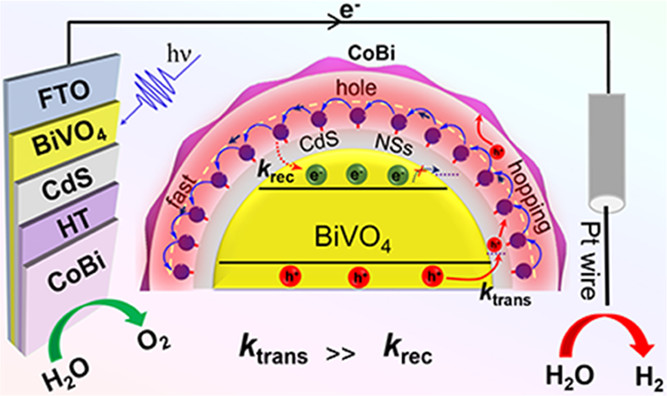祝贺牛富双同学的文章“Rapid Hole Extraction Based on Cascade Band Alignment Boosts Photoelectrochemical Water Oxidation Efficiency”在线发表于ACS Catalysis

工作简介:
使用光电化学(PEC)分解水是一种将太阳能转化为化学能环保且可持续的方法。BiVO4(BVO)因其合适的带隙(2.4–2.5 eV)被认为是最有前途的光阳极材料之一。但是,BVO的空穴扩散长度很短,只有70 nm,因此电荷会在表面/电解质界面快速复合,这大大限制了BVO在PEC电池中的水氧化效率。界面电荷复合的光子能量损失是实现高效率的PEC水分解的关键挑战之一。
复旦大学化学系胡可课题组开发了一种基于级联能级排列提高空穴转移动力学并抑制电荷复合以促进PEC水分解的策略。设计原理如图1所示。在此,构建了基于BVO的光阳极,其中BVO、硫化镉纳米片(CdS NSs)、空穴传输分子(HTs)和析氧助催化剂(OECs)以级联能带排列顺序组装,实现了高效的光生空穴提取以及快速的OEC空穴累积。
文章摘要:
Photon energy loss to interfacial charge recombination is one of the key challenges to achieving high efficiencies for solar water splitting in photoelectrochemical cells (PECs). Herein, BiVO4-based photoanodes are constructed, where BiVO4, cadmium sulfide nanosheets (CdS NSs), hole transport molecules (HTs), and oxygen evolution cocatalysts (OECs) assemble sequentially in a cascade band alignment for efficient photogenerated hole extraction and accumulation to OECs. In the photoanode assemblies, CdS NSs act as energetic barriers to suppress surface recombination. Thiolate-functionalized aryl amine HTs that anchor to CdS NSs are interfacial-charge-transfer mediators that efficiently extract the photogenerated holes. The oxidized HT (HT+) hops isoenergetically among adjacent HTs and finally accumulates oxidative equivalents to OEC. Transient absorption spectroscopy along with intensity-modulated photocurrent spectroscopy proves that HTs and CdS NSs accelerate hole-transfer kinetics and suppress recombination of surface-accumulated holes and electrons. Among the three HTs, triphenylamine shows the best performance. The best-performing photoanode assembly exhibits increased photocurrent density from 0.87 to 5.2 mA/cm2. The molecular approach to hole extraction from BiVO4 photoanodes provides a promising avenue for efficient photogenerated charge separation and collection to optimize the performance of PEC for water splitting. Niu, F. et. al. ACS Catal. 2022
原文链接:
https://www.x-mol.com/news/781510
